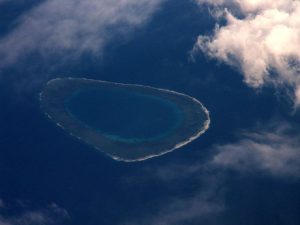Philippine President-elect Ferdinand Marcos Jr. has promised to uphold a key international court ruling against China’s claims in the South China Sea, insisting he would not allow “a single millimeter of our maritime coastal rights to be trampled upon.”
The July 2016 ruling from an arbitral tribunal based at the Permanent Court of Arbitration in the Hague rejected most of the Chinese government’s claims to the crucial waterway, including its expansive “nine-dash line” maritime claim.
“We have a very important ruling in our favor and we will use it to continue to assert our territorial rights. It is not a claim. It is already our territorial right,” Marcos told reporters yesterday, according to AFP.
“We’re talking about China. We talk to China consistently with a firm voice,” the president-elect said, but added, “We cannot go to war with them. That’s the last thing we need right now.”
The ruling was a result of the case filed in 2013 by the administration of President Benigno Aquino, following a lengthy stand-off with China over Scarborough Shoal, which ended with Beijing in possession of the feature.
The final ruling rejected the legal basis for nearly all of China’s expansive maritime and territorial claims in the South China Sea. In particular, it determined that China’s “nine-dash line” maritime claim was inconsistent with the United Nations Convention on the Law of the Sea (UNCLOS), and that Beijing had violated the Philippines’ sovereign rights within the latter’s 200-nautical-mile Exclusive Economic Zone (EEZ).
But the tribunal’s ruling had the misfortune to arrive just weeks after President Rodrigo Duterte was sworn into office, engineering a sharp left turn in the country’s foreign policy in general, and its approach to China in particular. Duterte immediately chose to set aside the legal victory in favor of direct talks with Chinese leader Xi Jinping, and the possibility of gaining access to infrastructure financing under Beijing’s Belt and Road Initiative.
In the second half of his six-year term, Duterte blew hot and cold on the arbitral award. In a speech to the U.N. General Assembly in September 2020, he reaffirmed the outcome of the case, saying that it was “now part of international law, beyond compromise and beyond the reach of passing governments to dilute, diminish, or abandon.” The next year, however, he described it as “a piece of paper” and that he said he would “throw that in the wastebasket.”
Marcos’ comments were his strongest so far on China and the long-running disputes in the South China Sea, where Beijing has launched a string of incursions into waters claimed by Manila. They also mark a departure from earlier remarks about the case, which suggested that he would continue with Duterte’s approach of putting the arbitral ruling to one side and negotiating directly with Beijing on the disputes.
During the election campaign, Marcos suggested that the ruling was useless because Beijing had rejected it out of hand. “That arbitration is no longer an arbitration if there’s only one party. So, it’s no longer available to us,” Marcos said in an interview in January. With the option of war something that “must be dismissed outright,” Marcos said that “bilateral agreement is what we are left with.” This suggested that Marcos, who in many ways represents a continuation of the Duterte administration, would also continue with his predecessor’s approach to the South China Sea question.
It is hard to read too much into Marcos’ comments. There would have been a lot of pressure on the incoming president to take a firm line on questions of sovereign rights, the one issue on which Duterte was not popular with the Filipino public. This likely explains Duterte’s occasional departures into support for the ruling, which nonetheless never translated into any coherent campaign to leverage it to rally international support behind the Philippine position.
On foreign policy, it appears that the Marcos administration will eschew the volatile shifts and sharp turns of Duterte in favor of a careful balance between China and the Philippines’ longstanding ally, the United States – what amounts to a half-way house between the Duterte and Aquino administrations.
“I do not subscribe to the old thinking of the Cold War where we had this spheres of influence where you’re under the Soviet Union or you’re under the United States,” Marcos said, according to AFP. “I think that we have to find an independent foreign policy where we are friends with everyone. It’s the only way.”
As I wrote earlier this week, striking such a balance might be easier said than done in a climate of increasing competition between Washington and Beijing. But how the new administration positions itself bears close watching.

































